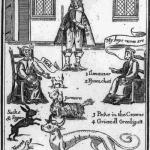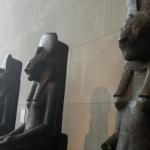Every new generation of seekers has some obstacle put in their way. In the days before the internet, the obstacle was not enough information. Now the obstacle is too much information. There are loads of websites and would-be teachers out there offering you all kinds of advice.
Then one day, you decide to take the plunge and find a face-to-face teacher. This is generally a good thing, as in my experience, most humans learn better from personal interaction than they do from online interactions or books.
However, due to the prevalence of books and people claiming to be the ultimate authority, and the prevalence of the counter-claim that the only valid authority is the inner self, we have a situation where many people can neither learn nor teach because they are too convinced of their own rightness to actually consider new ideas from their teachers or their students.
The theory of learning and teaching that I use in a coven setting is derived from Lev Vygotsky, who theorised the existence of a zone of proximal development. Vygotsky was a social constructivist; that is, he believed that learning was mediated through social interaction, and that our understanding of the world is socially constructed.
The zone of proximal development is the idea that there are some things the learner can do unaided (that they already know how to do); some things that they can do with guidance; and some that they cannot do. It also suggests that you need to build up from the things you can do, master the skills that you can do with help, and that this will provide the building blocks to access the next level (this idea was further developed by Jerome Bruner, David Wood, and Gail Ross with the concept of scaffolding).
The teacher and the student build a bridge between them so they can exchange ideas and knowledge and skills. But it is important to note that the teacher can also learn from the student.

This means that learning is a collaborative process between the teacher and the learner. It is not the case that the learner is an empty bucket that the teacher fills up with facts; rather, the teacher and the learner discover and elaborate the existing skills of the learner (and the learner may also be able to teach the teacher a thing or two). This is especially true of magical and ritual skills, which are often extensions of existing abilities.
So, if you are a seeker, find out from any potential teacher you meet what their methods are, and what they expect you to do. Do they expect you to ask questions? Do they welcome and celebrate your existing skills and knowledge? Do they recognise that you have a unique learning style? Do they invite you to bring prior experience to the table to enrich the learning process? Do they support students with dyslexia, dyspraxia, or other differences?
Many seekers seem to assume that all teachers are going to dictate a prescribed way of doing magic and ritual which will destroy the spontaneity and joy of it. Perhaps there are teachers out there who behave like that, but the majority are rather more flexible than that. If you do find a teacher who won’t allow you to ask questions, who belittles your existing skills and prior experience, or who insists on doing everything in a set way, then run a mile – but don’t assume that all teachers are like that.
The method that I use for teaching conceptual ideas is the sharing circle. This is fairly accessible for people with dyslexia, because it gives people time to formulate their thoughts. There is a set topic for each discussion (such as reincarnation, the nature of deities, the idea of the sacred, the four elements, etc) and we use a token to indicate who can speak at any one time. The token is passed around the circle, and everyone gets a chance to air their thoughts on the topic. Sometimes I use other tools such as mind mapping to enable people to tease out their ideas on a topic.
In the circle, when teaching magical techniques, I encourage people to try different techniques, in order to work out what feels right for them. Some people prefer one set of gestures for calling the quarters, cleansing the circle, and so on; others prefer a different set of gestures. These may stem from a different physical relationship with the energies, or from a different philosophical concept of what energies are and how we might relate to them. None of these different gestures and words is necessarily wrong. Obviously your tradition might have a specific way of doing these things, but my BoS offers a selection of different words and gestures for calling the quarters, casting the circle, and so on, and which ones you choose may be different, depending on different circumstances and choices.
I always encourage people to make a connection with the energy they are invoking or evoking first, and then to speak the words. After all, the energy is more important, surely? It can also be helpful to use analogies from physical experience in order to get people sensing subtle energies. I have also noticed that different people experience subtle energies differently – some people see them as colours; others experience them as heat, cold, or other physical sensations.
Another thing that I have noticed is that people are either overly reliant on books, and regard them as the ultimate authority on magical matters; or they dismiss books entirely, and want to totally rely on their instincts. Surely there has to be a happy medium between these two extremes? If something you read in a book doesn’t agree with your experience, then examine why that might be the case, and either adjust your world-view, or discard what the book says. If the book is wrong in this instance, that doesn’t invalidate either that book, or books in general. If the book happens to be right in this instance, that doesn’t invalidate all personal experiences.
As with pretty much anything, it’s all about finding the middle way between two extremes.
















